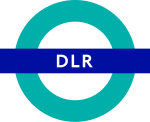Docklands Light railway
 |
|

A DLR train arrives at Royal Victoria
|
|
| Overview | |
|---|---|
| Owner | Docklands Light Railway Ltd, part of Transport for London |
| Locale | Greater London |
| Transit type | Rapid transit/Light metro |
| Number of lines | 7 |
| Number of stations | 45 |
| Daily ridership | 340,000 (daily average, DfT 2017) |
| Annual ridership | 117 million (DfT) |
| Website | DLR |
| Operation | |
| Began operation | 31 August 1987 |
| Operator(s) | KeolisAmey Docklands Ltd. Keolis (70%)/Amey (30%) |
| Number of vehicles | 149 |
| Train length | 2–3 carriages per trainset |
| Technical | |
| System length | 38 km (24 mi) |
| Track gauge | 1,435 mm (4 ft 8 1⁄2 in) standard gauge |
| Electrification | 750 V DC third rail |
| Average speed | 80 km/h (50 mph) |
| Top speed | 100 km/h (62 mph) |
The Docklands Light Railway (DLR) is an automated light metro system opened in 1987 to serve the redeveloped Docklands area of London. It reaches north to Stratford, south to Lewisham, west to Tower Gateway and Bank in the City of London financial district, and east to Beckton, London City Airport and Woolwich Arsenal.
The system uses minimal staffing on trains and at major interchange stations; the four below-ground stations are staffed to comply with underground station fire and safety requirements. Similar proposals have been made for the Tube.
The DLR is operated under a franchise awarded by Transport for London to KeolisAmey Docklands, a joint venture between transport operator Keolis and infrastructure specialists Amey plc. It was previously run for over 17 years by Serco Docklands, part of the Serco Group. The system is owned by Docklands Light Railway Ltd, part of the London Rail division of Transport for London. In Fiscal Year 2014, the DLR carried 110.2 million passengers. It has been extended several times and further extensions are under consideration.
The docks immediately east of Central London began to decline in the early 1960s as cargo became containerised. They had been connected to the national railway network via the London and Blackwall Railway (L&BR), which was closed in 1966 for lack of traffic. The opening of the Tilbury container docks, further east in Essex, finally rendered them redundant, and in 1980 the government gained control of the now-derelict area.
...
Wikipedia
